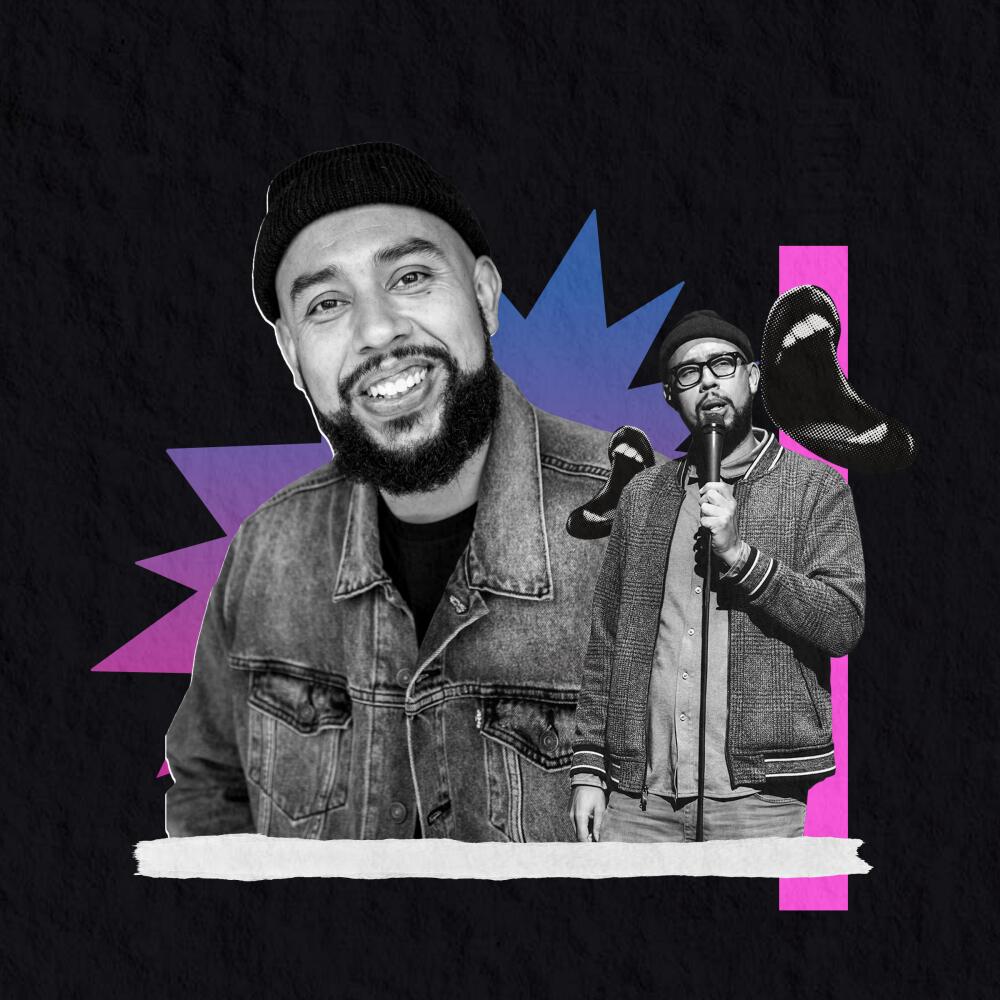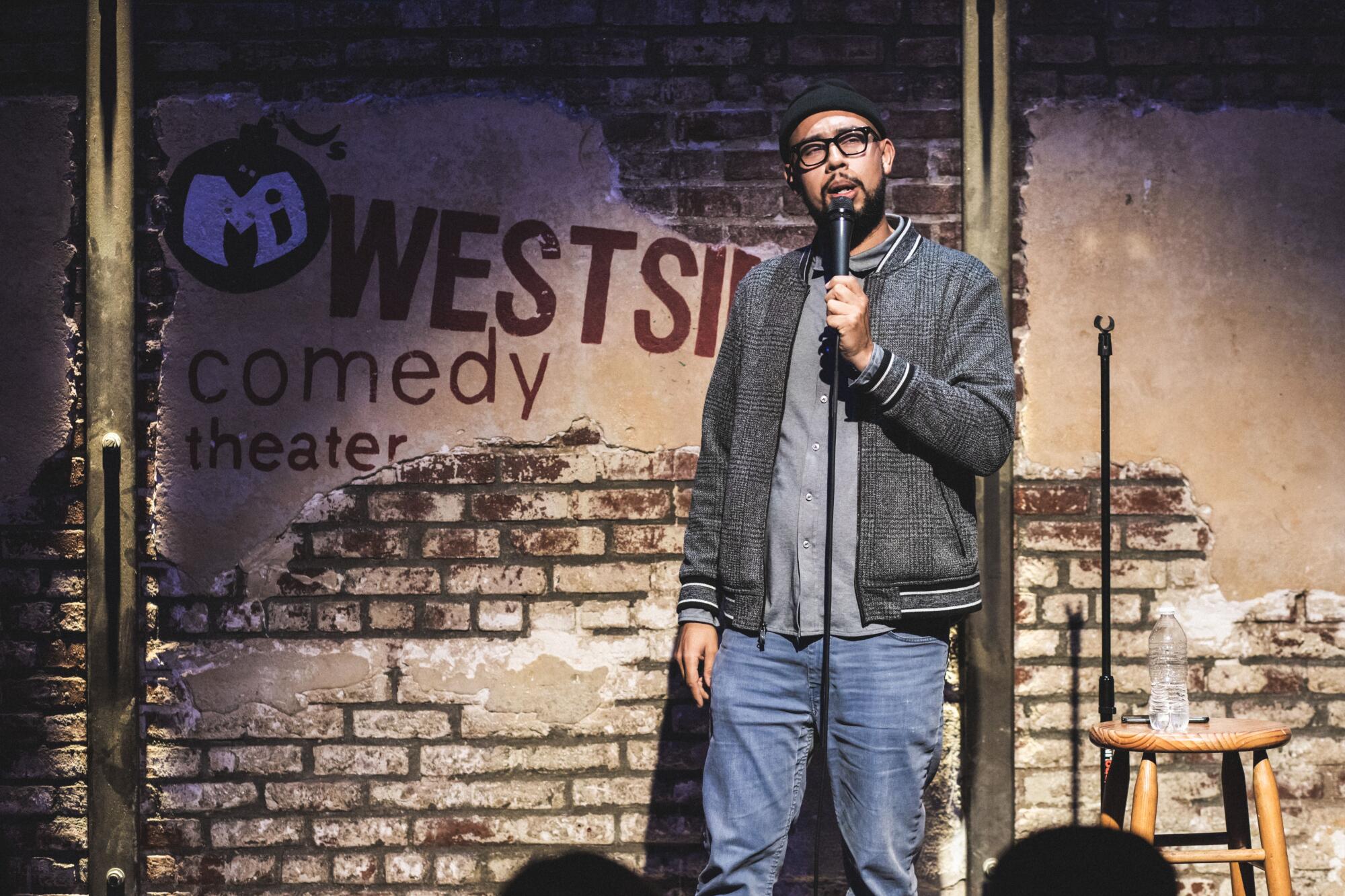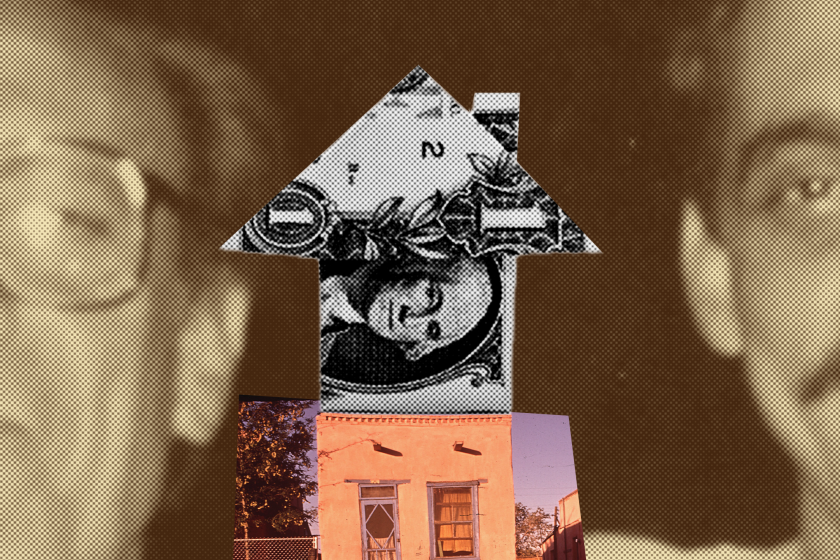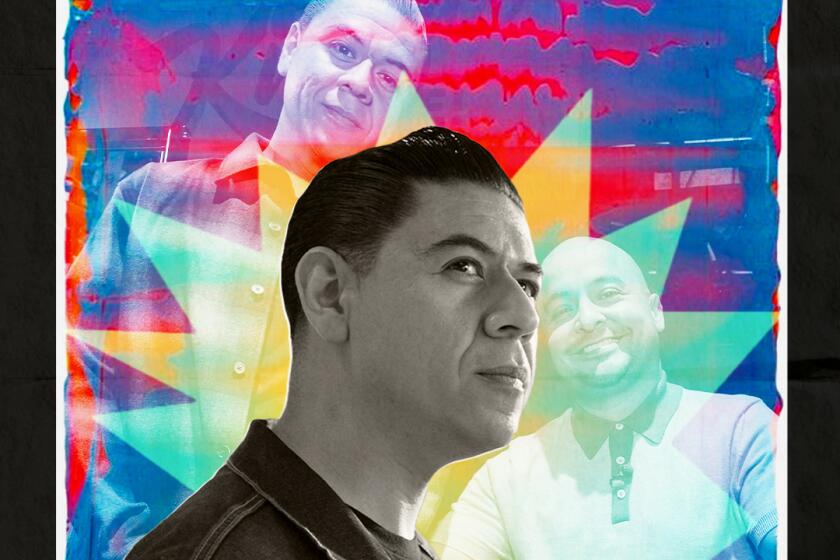
- Share via
Comedian Jesus Trejo knows a thing or two about crafting comedy out of personal experiences.
His journey as an only child and family caretaker has enriched his stand-up since his early days at the Comedy Store, where he initially worked as a valet.
Exactly when our parents can retire can wildly vary within immigrant and first-generation communities that deal with issues like environmental racism, barriers to healthcare, gentrification, wage inequality and more.
“The one thing that I felt like I was an expert on was my specific caregiving journey,” Trejo said. “A lot of Latinos are caregivers and don’t get paid for it.”
Trejo has found ways to incorporate that experience into his comedy. Most notably, he was part of a 2020 AARP documentary, “Care to Laugh,” that explored the most intimate parts of his life as a full-time caregiver and comedian. In it, he jokes that he has two kids, “ages 70 and 71”— a nod to his parents.
Trejo has put out two comedy specials — “Stay at Home Son” on Showtime and “Practicing” on YouTube — and has been on the “Tonight Show Starring Jimmy Fallon” twice. He’s also a part-time actor, with roles in Netflix’s sitcom “Mr. Iglesias” and Hulu’s “This Fool,” where he was also a writer.
Now, the Long Beach local is exploring the jokes beyond the stage as host and executive producer of a new PBS series, “Roots of Comedy.”
We spoke to Chris Estrada, creator of ‘This Fool,’ about the cancellation of the beloved Hulu series.
“I find that every joke can be traced back to the community,” Trejo said.
In the short travel documentary, Trejo engages with rising comedians as they explain the upbringing and communities that shape their sets. Trejo steps into the role of host and executive producer with comedy as his guiding light.
“Everything I do is aimed in that direction,” Trejo shared.
All six episodes of “Roots of Comedy” launched on May 24 via the PBS app, with the broadcast premier set for June 21.
The following interview has been edited for clarity and length.
You are a quadruple threat as a comedian, actor, writer and now executive producer for the PBS miniseries “Roots of Comedy.” How do you do it all?
I’m just grateful to be in spaces that I never thought I’d see myself in. I feel like I give it my all. I was given this great work ethic from my parents. There’s this voice in your head and it’s like, “Oh, I don’t want to be lazy.”
Comedy in general is like my North Star. I feel like everything I do is aimed in that direction and underneath it is storytelling in every way shape and form, whether it’s a kids’ book, whether it’s on stage doing stand-up, storytelling writing, acting.
How old were you when you started stand-up comedy?
I was 20 years old and I’m 38 now. It took me a whole year to get up after the first time I did stand-up because I bombed so hard. I was not getting any type of reaction on stage till around Year 6. It was painful. Sometimes people ask me, “Why’d you stick with it?” I guess I’m terco [stubborn] so I just stuck with it.
In your comedy, you’ve often shared how you took on the caretaker role as an only child, does that experience peek into your work now?
My mother passed away last year due to dementia. It was difficult. I’ve been a caregiver for her for a long time and currently a caregiver for my dad. It’s tough. I’ve done projects with AARP around disrupting ageism and doing a lot of work around caregiving. We did a documentary years ago called “Care to Laugh.” It’s a documentary where AARP followed me for a year doing stand-up all while I’m taking care of my parents. In my material, you definitely see stories that I’ve been able to tell about my caregiving journey.
What was your family’s reaction in seeing you perform?
My mom didn’t understand what I was doing for a long time. In the last couple of years, I think my mom came around to understanding stand-up and would get so happy. My dad has come around a ton. We sat down recently and watched the PBS series “Roots of Comedy” together. It was really cool for him to see that I hosted this.

“Roots of Comedy” dives into the lives of six up-and-coming comedians, why go deeper into their stories than what we see on stage?
When you see a comedian on stage, you see the joke and I find that every joke can be traced back to community. People want to see behind the curtain. They want to understand where the comedian came from and the community they belong to. I think that informs a lot of the type of comedy they do on stage.
On top of being in comedy, you’ve also written an award-winning children’s book based on your father’s career as a landscaper, and another book on your mother’s love of plants. What is something that you would tell your younger self?
If I could go back and talk to my younger self, I would encourage him to continue being a kid because all those things that I did as a kid have now become tools that have allowed me to storytell. That’s such a wild thing for me to tell a first-generation kid that was born here, that didn’t speak the language until later.
You were also a writer for “This Fool” on Hulu, which was recently canceled after Season 2. What do you think is lost when we cancel shows like this?
It was a difficult time [for the show]. There was a writer’s strike, so there wasn’t as much promotion as there should have been on behalf of the creators and actors involved. I’m so grateful that I got to be a part of it and be a staff writer on the second season.
When you get rid of a show that is specific to our community, I think it really sucks. Because when one door closes, it usually takes a very long time for another door to open, and it shouldn’t be like that. I think there’s enough platforms in this day and age for there to be multiple shows that represent our community. It does hurt us. Latino projects don’t get afforded the same opportunities [as other projects].
More to Read
The Latinx experience chronicled
Get the Latinx Files newsletter for stories that capture the multitudes within our communities.
You may occasionally receive promotional content from the Los Angeles Times.









